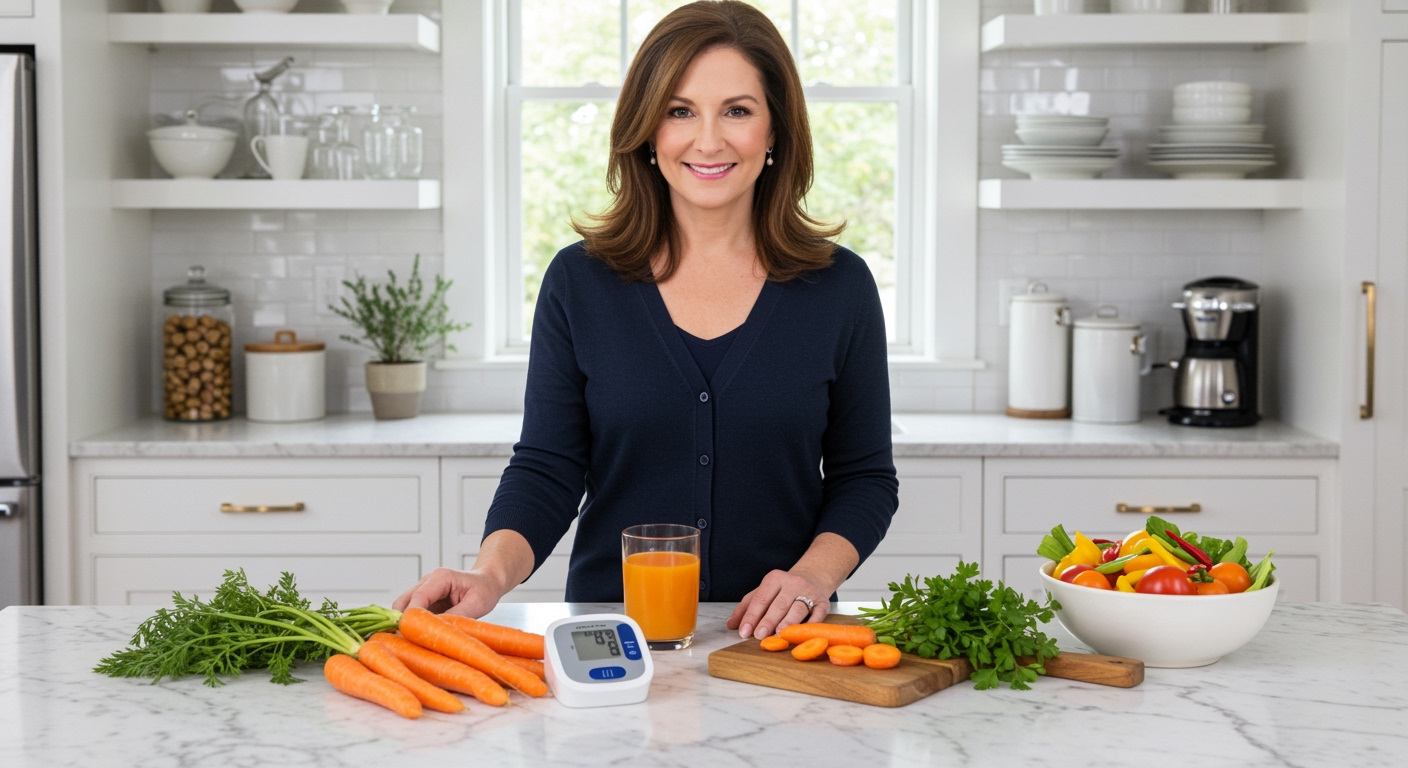✪ Key Takeaway: Carrots contain potassium and fiber that may help support healthy blood pressure levels when part of a balanced diet.
Introduction
Your doctor just told you that your blood pressure runs low and you need to make some dietary changes.
You start wondering if simple foods like carrots could actually help raise your blood pressure to healthier levels, or if you need to look elsewhere for solutions.
Hi, I’m Abdur, your nutrition coach and today I’m going to explain exactly how carrots affect your blood pressure and whether they can truly help with hypotension.
What Nutrients in Carrots Affect Blood Pressure?
Carrots pack several nutrients that directly influence your cardiovascular system and blood pressure regulation.
Potassium stands out as the most important mineral for blood pressure control in carrots.
One medium carrot provides about 230 milligrams of potassium, which helps your kidneys remove excess sodium from your body.
This mineral also helps your blood vessels relax, which can improve circulation and support healthy blood pressure levels.
Fiber in carrots also plays a role by helping regulate blood sugar levels and supporting overall heart health.
Beta-carotene, the compound that gives carrots their orange color, acts as an antioxidant that may help protect your blood vessels from damage and support healthy circulation.
✪ Fact: Raw carrots contain more potassium per serving than cooked carrots due to nutrient loss during cooking.
Can Carrots Actually Raise Low Blood Pressure?
The relationship between carrots and low blood pressure is more complex than most people realize.
Carrots contain nutrients that support healthy blood pressure regulation, but they work differently than you might expect.
The potassium in carrots helps your body maintain proper fluid balance, which is crucial for people with hypotension who often struggle with blood volume issues.
However, carrots alone cannot dramatically raise your blood pressure if you have chronic hypotension.
They work best as part of a comprehensive approach that includes adequate salt intake, proper hydration, and other blood pressure supporting foods.
The natural sugars in carrots can provide quick energy and may help prevent blood pressure drops that occur when blood sugar falls too low.
Think of carrots as a supportive player rather than a star performer in managing low blood pressure.
✪ Pro Tip: Eat carrots with a small amount of healthy fat to improve beta-carotene absorption and maximize benefits.
How Should You Eat Carrots for Blood Pressure Benefits?
The way you prepare and eat carrots can significantly impact their effectiveness for blood pressure support.
Raw carrots retain the highest levels of potassium and other water-soluble vitamins that support cardiovascular health.
Eating them with meals helps slow down sugar absorption and provides sustained energy that can prevent blood pressure dips.
Carrot juice concentrates the nutrients but removes the fiber, which means you get more potassium per serving but lose the blood sugar stabilizing benefits.
If you choose juice, limit yourself to 4-6 ounces per day to avoid excessive sugar intake.
Lightly steamed carrots offer a middle ground, retaining most nutrients while becoming easier to digest for people with sensitive stomachs.
Combining carrots with foods that contain healthy fats like olive oil or nuts helps your body absorb the fat-soluble vitamins more effectively.
✪ Note: People taking blood pressure medications should consult their doctor before making significant dietary changes.
What Other Foods Work Better Than Carrots?
While carrots offer some benefits, several other foods provide more targeted support for low blood pressure.
Salty foods like olives, pickles, and naturally cured meats can help raise blood pressure more directly than carrots.
Beets contain natural nitrates that help improve blood flow and may be more effective than carrots for circulation support.
Bananas provide significantly more potassium than carrots, with about 420 milligrams per medium fruit compared to 230 milligrams in a carrot.
Leafy greens like spinach and kale offer higher concentrations of minerals that support healthy blood pressure regulation.
Dark chocolate contains compounds that may help improve blood vessel function and support healthy circulation patterns.
The key is combining carrots with these more potent foods rather than relying on them alone for blood pressure management.
✪ Pro Tip: Create a daily snack mix with carrots, nuts, and a small amount of sea salt for balanced blood pressure support.
The Bottom Line
Carrots can be a helpful addition to your diet if you have low blood pressure, but they work best as part of a comprehensive nutritional approach rather than a standalone solution.
Good nutrition is like building a house – you need many different materials, not just one type of brick.
I would love to hear about your experience with carrots and blood pressure management, so please share your thoughts or questions in the comments below.
References
At NutritionCrown, we use quality and credible sources to ensure our content is accurate and trustworthy. Below are the sources referenced in creating this article:





